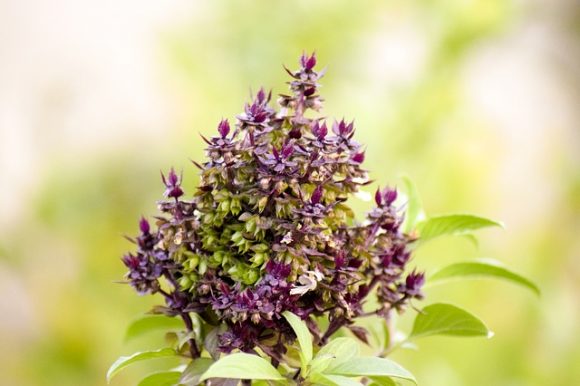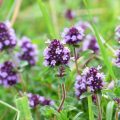- The Miraculous Shiny Bush Plant - January 18, 2021
- Colorful, Edible and Medicinal Celosia - January 10, 2021
- Radish, a Nutritional Power House - December 19, 2020
Holy basil, botanically known as ocimum tenuiflorum and fondly referred to as tulasi, or tulsi, is a green, perennial, flowering herb belonging to the mint family. The mint family is popular for its culinary and medicinal qualities with plants such as mint, sage, oregano and lavender topping the list.
Holy basil is native to the Indian region and can be found growing throughout Southeast Asia. However, the popularity of the mint family has seen it spread and get naturalized to various regions of the world including Africa and North America.
[Note: The Right Flowers is not a medical site. Knowledge of and information about the therapeutic benefits and applications of flowers, while known through the ages, does not constitute medical advice. If you are having health issues, you should consult with a physician.]
Holy basil thrives in fertile loamy to poor laterite and alkaline soils. It prefers well-drained places with average to high rainfall. The plant flourishes in full sun, however, it can grow in partial shade with the likelihood of diminished oil yields.
The holy basil plant is considered an elixir for life due to its spiritual, culinary and medicinal properties. The plant is sacred to Hinduism and widely used in Ayurvedic medicine. According to the Ayurveda tradition, it cleanses the body of toxins, promotes purity and relieves digestive tract problems.
In Hindu mythology, holy basil is associated with the goddess Tulsi, (this explains why the plant is fondly referred to as tulsi) the consort of god Vishnu. Hindu families usually cultivate and keep the plant around the house for spiritual protection and other religious practices.
Holy basil’s flowers, leaves, and stems are rich in nutrients such as zinc, vitamin A and C, iron, calcium, and chlorophyll. In addition, its aromatic qualities make the herb a great spice and vegetable. This explains why various species of basil are the main ingredients in pesto sauce. Apart from being an ingredient in pesto sauce, all parts of holy basil are used to flavor soups and other sauces.
Apart from its culinary qualities, the plant contains essential oils such as nerol, camphor, and eugenol as well as various flavonoids and terpenes. These compounds give holy basil potent medicinal qualities.
Studies have shown that holy basil has anti-anxiety and anti-depressant qualities that are comparable to drugs used to treat depression and anxiety such as diazepam. Herbal experts say that drinking holy basil infusion daily is as effective as yoga. The infusion helps in clearing your mind and promotes a sense of well-being.
Other studies indicate that the plant has broad-spectrum antimicrobial activity (anti-fungal, anti-oxidant, anti-protozoa, anthelmintic, anti-inflammatory, anti-diabetic and anti-carcinogenic).
Holy basil’s health benefits are attributed to the high levels of microbial and phenolic compounds in the plant. These compounds help the body in fighting off pathogens as well as protecting the body against the effects of free radicals and oxidative stress.
There is no doubt that holy basil is a herb that is good for your body, mind, and spirit. And a true elixir of life.





